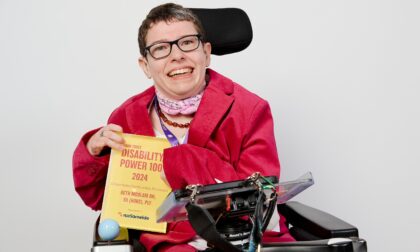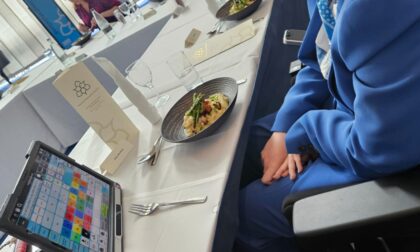I’ve spent several years using spoon theory to effectively explain to others my physical energy and fatigue levels. However, I realise that spoon theory could also be adapted to self-management of my speech production. There is a definite link between my physical energy and fatigue levels and my speech production and communication. Hence the topic of this post AAC, spoons and speech fatigue.
Managing my physical spoons
Each morning I hope that physically I will have my full allocation of spoons to do the things I want during the day. I’ll look at what I have on and decide how to conserve my physical energy for the things that are important. For instance, if there is something in the evening I will take things easier during the day.
Spoon theory and speech production
I might be in a good physical position but despite this, I can still have a poor speech day. If I’m tired or ill then my voice is automatically affected, I can be quiet or speak with little clarity. On the other hand, my ability to speak clearly and fluently can be dictated by how much I am using my voice each day. I’ve discovered using spoon theory can help me manage my speech production and when I should use my communication aid. So, here goes with AAC, spoons and speech fatigue.
AAC is an integral part of my life
Before we begin I want to make it clear that AAC is central to my life and communication. It is only with close family and my team I have some choices over not using it. The reality is I’m only understood in context, and then not always. So even when I’m using my natural voice I need to use AAC to set that context.
Why I use AAC
Let’s start with why I use AAC, I have dysarthria. This means my speech is never clear or fluent, but as I’ve said I can be understood in some environments, by some people. Dysarthria is a part of my cerebral palsy and is a term to describe a weakness of the mouth, tongue and throat muscles. These include the muscles in the lips, face and jaw. Then there are 8 muscles in the tongue and 50 pairs of muscles in the throat, as well as those in the face and jaw. All of these have to work in harmony to produce clear and understandable speech.
For the majority of people, these muscles all work together well unconsciously. If they decide to speak the words form and appear like magic. In my case, I know what I want to say but the muscles don’t always coordinate, or they choose to do their own thing. And, then my speech production can also be affected by fatigue. This means my speech output can vary dramatically dependent on varying factors. These include my posture, how tired I am, my energy levels and how much talking I have already done. What I say now might come out differently from how I said it yesterday, and what I might say later in the day.
Overusing my natural voice
Over the years I’ve caused considerable stress to my voice. For instance, when I first started university I was making a huge effort to talk more clearly. This meant forcing myself to articulate every word and putting power into my voice. I often find when I am passionate about a subject then my voice becomes more strident. Besides having body fatigue or being ill I also find the activity I’m doing will affect how much power I need to use. For example, first thing in the morning if I’m laid flat in bed I need more power to be understood. But if I sit up (supported in my profiling bed) then the same amount of power means I’m suddenly shouting.
The physical signs of speech exhaustion
The physical signs of voice exhaustion can be felt by me and seen or heard by those who know me well. My throat externally can appear swollen, it’s taut and tight. Internally it starts to hurt to talk. My voice sounds and feels hoarse, it becomes gruff and lower-pitched. In fact, it is often much quieter and appears to warble as time goes on. I then find I cough more trying to swallow saliva, drink and food. These days when I get to this stage I know I should have stopped talking earlier and used other communication resources available to me.
The impact of communication partners
The effort I need to put into talking also varies depending on who my communication partner is. For instance, with people I don’t know, compared to my close network, I automatically go for AAC first. However, some activities are dependent on more verbal speech than others. A good example would be when I was part of GB Boccia. I’d need to talk on and off all day in the context of play, there wasn’t time to use a communication aid on the court. I could do this easily at the beginning of each camp, by the end of the week I would feel like I was forcing my voice. What was easy in the mornings was much harder by the end of the day.
My team and family are exceptional communication partners. They understand this and accept my choice of communication strategy, letting it change during the day as I feel the need. Sadly, I’ve also experienced poor communication partners. These are the people who think because they can understand me then I have to speak. They don’t want to recognise that I have the right to choose how I communicate. They are reluctant to wait for me to use my communication aid because ‘they don’t need it’. Worse still are those who think my speech will get better with practice! Sorry, no it won’t.
How spoon theory helps me manage speech fatigue
Coming back to AAC, spoons and speech fatigue then spoon theory has become really helpful in managing my voice each day. In university, I choose to spontaneously speak in lectures, with my PA repeating my utterance verbatim, rather than using my communication aid. This helps me to input in as near real-time as possible. I’ve written elsewhere about trying to respond in real-time using AAC and some of the strategies that are needed for appropriate input.
As a consequence of these realisations, my approach to my speaking has changed. The initial decisions are based on how my body feels. If I have fewer physical spoons when I start the day then I automatically have fewer speech spoons. But taking this one step further I now look at my day and decided how many spoons I will need for each activity. This means that I will prioritise my speech energy levels. For instance, morning and breakfast routines need very little energy. Primarily because I’m not a morning person so I’m not talking a lot!
Being pragmatic with my speech spoons
Some activities cause my speech spoons to get used up more quickly than others. If I know I will be doing academic work then I know I will need to use both my communication aid and my voice. If I’m going to be sat in lectures my voice will be preserved for other times. However, if I’m going to a concert and know I want to sing I know I might not want to speak all day! How I choose to use my speech spoons means being pragmatic and sensible throughout the rest of the day.
On a rare ‘good’ speech day at home when my communication aid goes on charge at night it might have 85% battery left. This is the outcome of a chilled day with great communication partners. On a day where my speech production spoons run out early or I’ve chosen to only use my communication aid there may be 10% battery remaining. And, on occasions I might have had to resort to my back up communication aid.
At a recent AAC weekend event I used my device with others from the moment I woke up to the end of the day. This validated my spoon theory! I might have been mentally tired from the long day of intense interaction. However, I realised at dinner time that I had 4 speech spoons remaining. The second day was in the same vein. When I got home my hand was tired from all the inputting, but my voice was still speech ready!
The privilege of choice
I know that I’m actually very lucky to have choices about how I communicate. I’m blessed with a core of people who get much of what I say in context. However, because I’m classed as unintelligible to strangers, and out of context, I rely on alternative communication resources. My AAC device goes everywhere with me, and I always have a backup alphabet card. Whatever I choose regarding AAC I’m finding applying spoon theory is giving me greater control over my speech fatigue.
If you have found AAC, spoons and speech fatigue helpful please feel free to share.





If you found this interesting or
helpful please feel free to share.